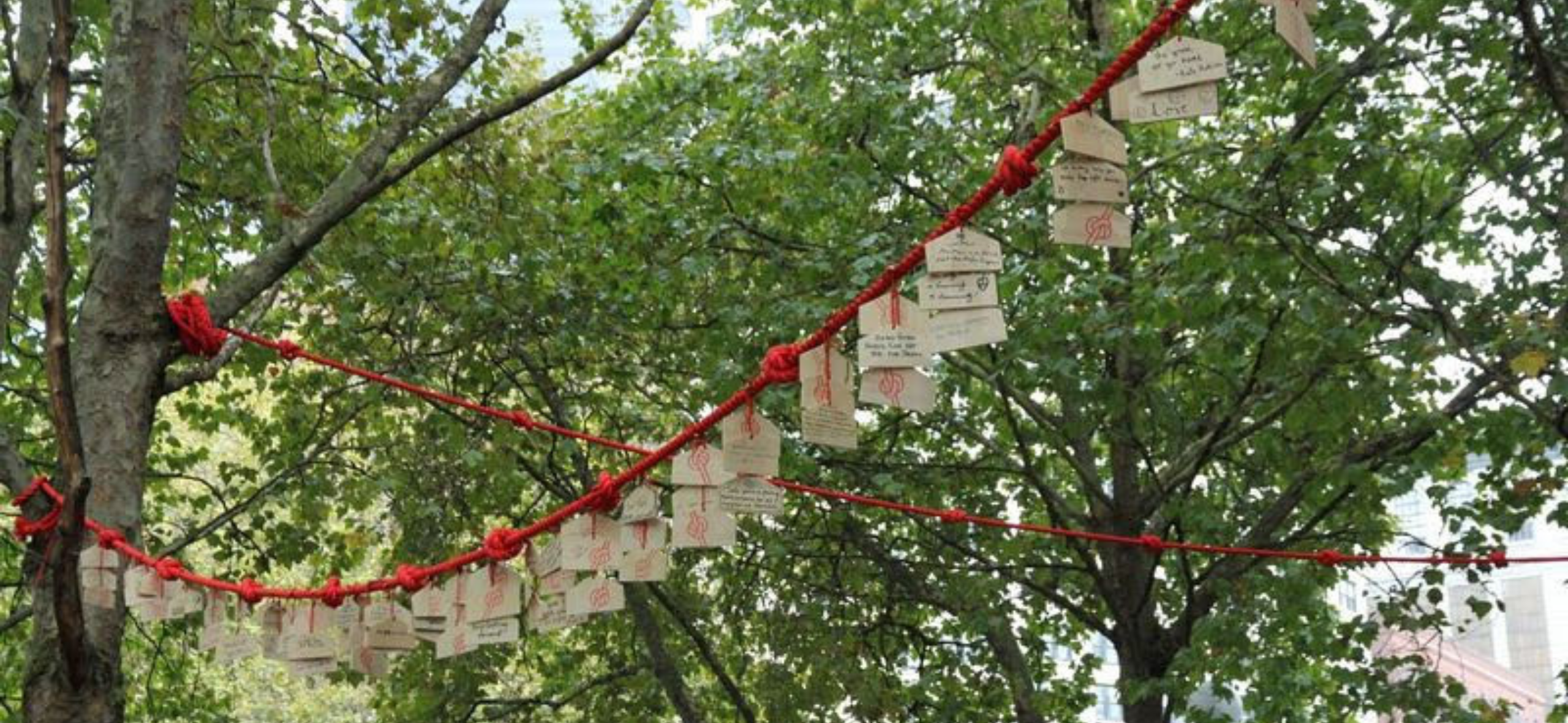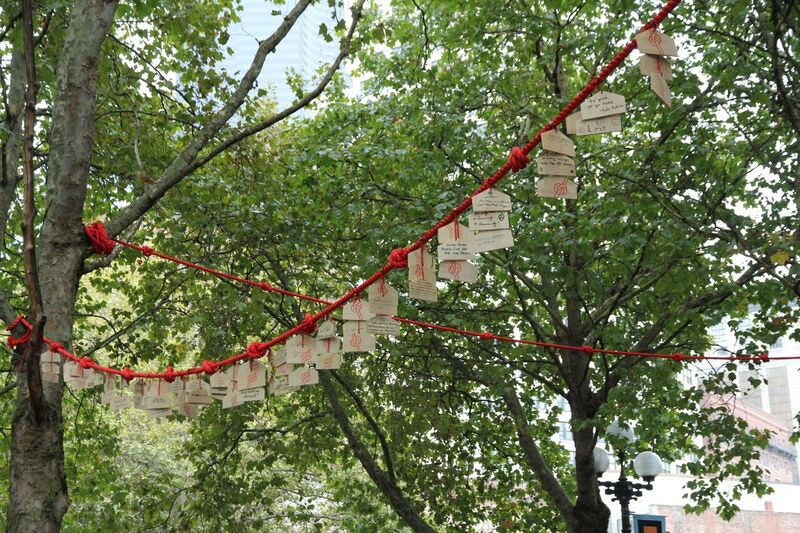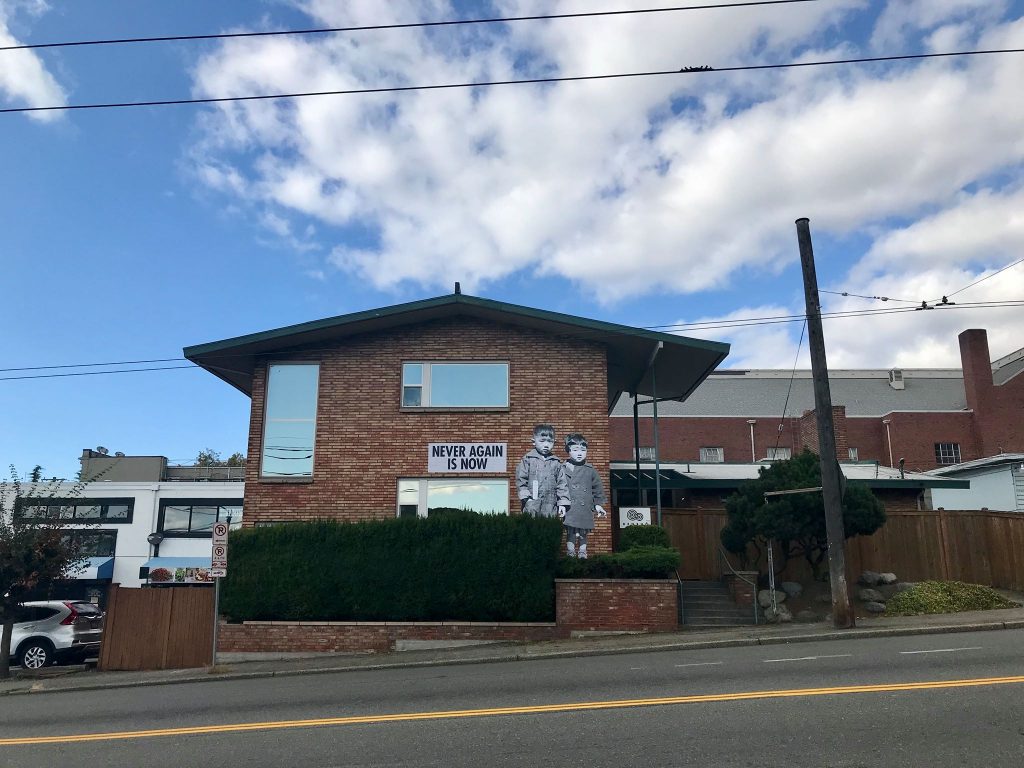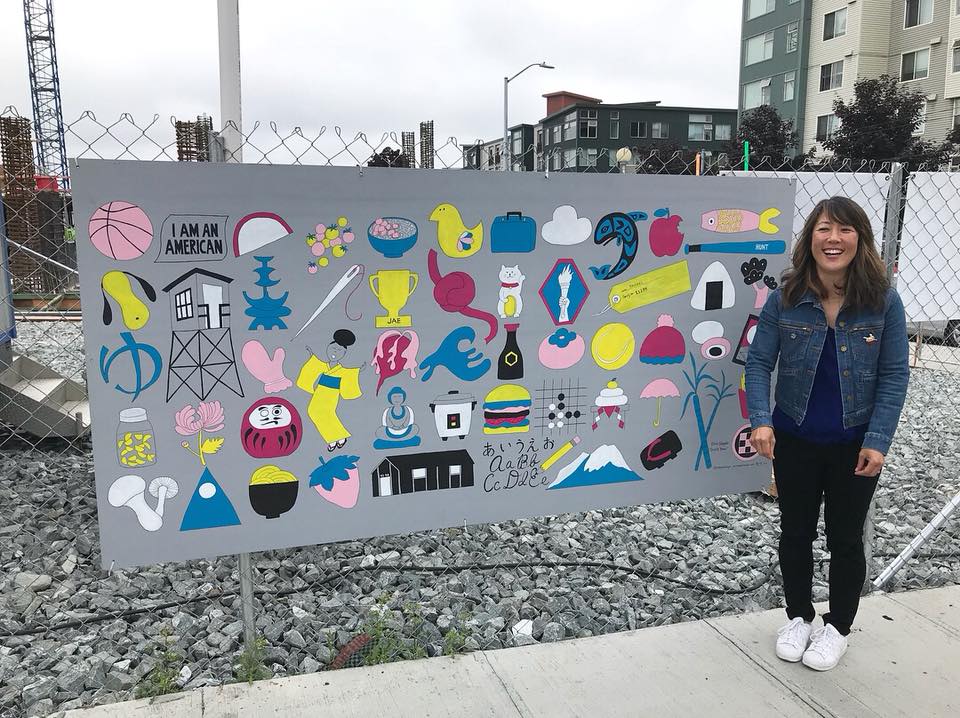Densho’s Artist-in-Residence program supports emerging artists to create artwork about WWII Japanese American incarceration history. The aim of the residency is to help educate general audiences about Japanese American WWII incarceration; connect this history to current instances of racial injustice and inequity; and to foster healing and dialogue around historical memory and intergenerational trauma.
Our 2018 artists were: Erin Shigaki, Kiku Huges, Tani Ikeda, and Paul Kikuchi.
Erin Shigaki
Erin Shigaki (she/her) started off as Densho’s go-to designer, but during her residency she explored large scale public art installations that have used our archives and messages in really creative ways.
Erin installed “Senninbari Shrine” in Seattle’s Occidental Park. She called it a reflection on “how to create a place of protection: from both internal and external evils, past and present. Senninbari is a Japanese word meaning ‘one thousand person stitches.’ Incarcerated Japanese American women followed an old Shinto tradition of sewing red french knots onto garments to serve as protective amulets for their men departing in segregated units for WWII battlefields. The practice was that 1,000 knots were sewn on each garment by 1,000 different women. The red knotted ropes in my piece refer to this loving, communal practice — and make it fiercely bold. These garlands are adorned with handwritten ema (plaques) on which hundreds of Seattle community members wrote positive wishes or hopes for the future.”
Erin also installed a large wheat paste mural on the side of Densho’s building that faces a busy Seattle intersection. The mural features a Dorothea Lange photo of two unnamed children the day they entered the Turlock detention facility. The fear and worry on their faces is almost palpable; combining it with the “Never Again is Now” message sends a powerful reminder that we all have urgent work to do. As all paper murals will, the wheatpaste eventually deteriorated and is no longer visible, but you can forever see it in the time lapse video we made of the installation.
Erin’s work has provoked a lot of necessary conversations, and the residency has had a major impact for her as well. She writes, “I am deeply grateful to Densho for the support and freedom to try new mediums and express my passion for our community. I feel especially drawn to make work about the Japanese American incarceration and how it affected my family and community. My goal is to tell some of the 120,000 stories of injustice, as well as to reveal moments of resilience and beauty. What happened then rhymes so clearly with what is happening today and I cannot be silent.”
Learn more about Erin on her website.
Kiku Hughes
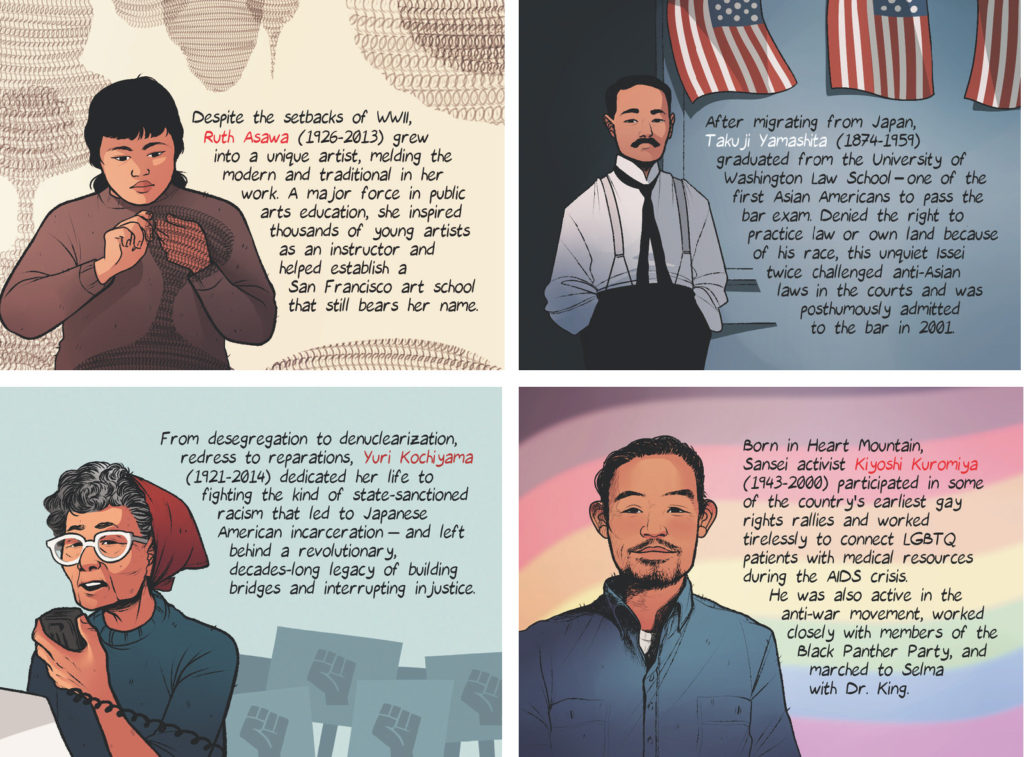
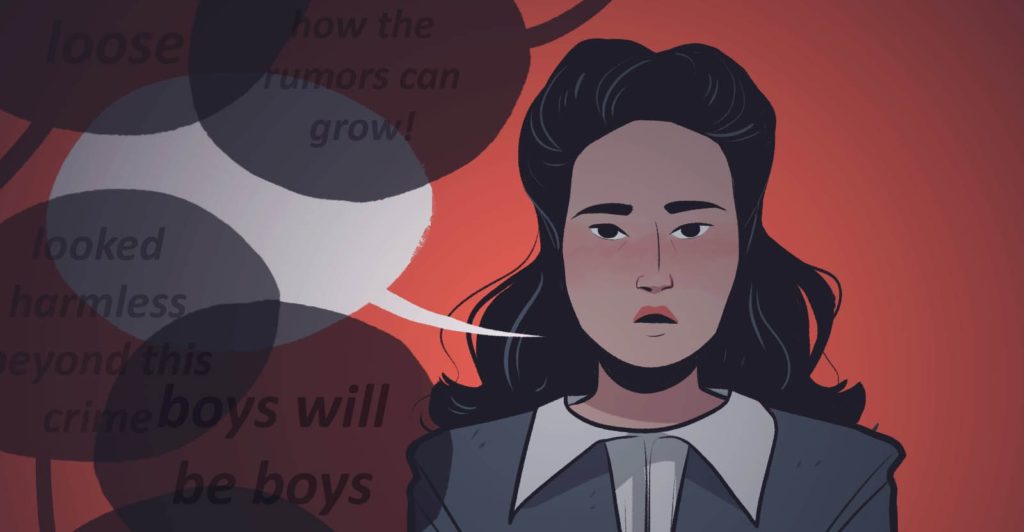
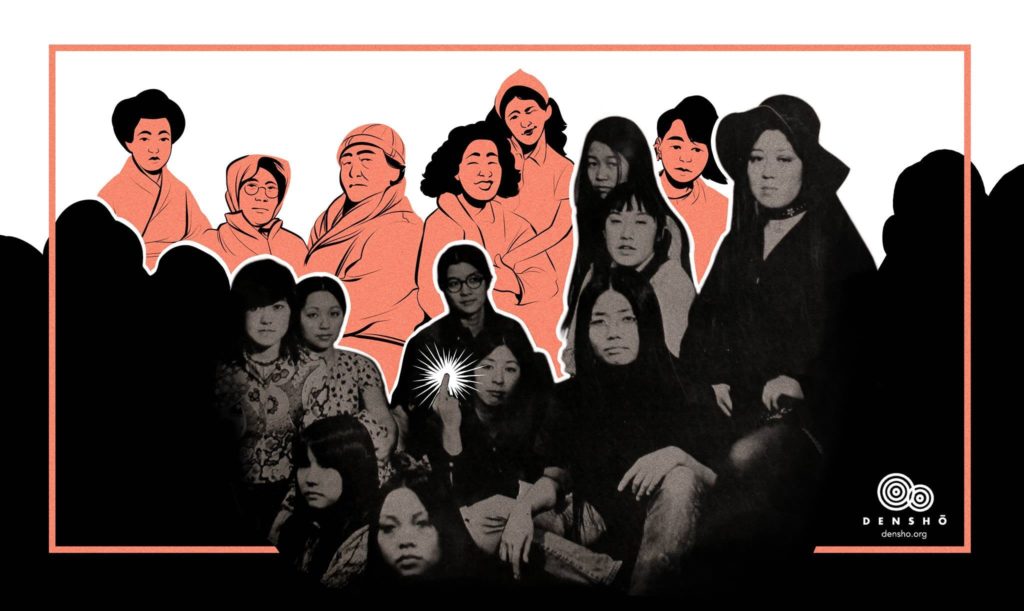
Kiku Hughes (she/her) introduced Japanese American historical figures to wide audiences through illustrations that Densho shared as magnets, pins, and as digital images on our blog and social media.
Kiku Hughes is an incredible comics artist. Her two great passions are science fiction and social justice, and her life’s mission is to incorporate both into every story she tells. We were lucky enough to have her illustrate engaging images that were shared widely across social media platforms.
“Densho is an invaluable resource and a powerful voice. Many details of Japanese American incarceration has been quieted, dismissed and hidden, but I’ve learned so much and feel so much more connected to my community and my own family thanks to the Densho archives. Most importantly, Densho is finding new ways to share these important stories to make sure nobody forgets what fear-mongering and racist fervor can lead to. I was honored to help Densho share these stories with illustrations to make them even more accessible.”
Since her residency, Kiku published her first graphic novel, about Japanese American incarceration. Displacement, a story about actively reliving and reviving the past, was published in 2019. More information about the book here!
Tani Ikeda
Densho’s 2018 Day of Remembrance event, “Our History, Our Responsibility,” honored Japanese Americans of World War II and offered solidarity with American Muslims facing a sharp rise in Islamophobic rhetoric, policy, and hate crimes. As the event description put it: “We’ve been here before, and it is our responsibility to ensure that we do not continue down a path that values prejudice and a false sense of security over liberty and justice.”
The event featured Khizr Khan, the Gold Star father who achieved public celebrity after denouncing Trump at the 2016 Democratic National Convention.This short film by Tani Ikeda follows as her father and Densho’s founder, Tom Ikeda, meets Khan. Together, they explore shared identities and a shared allegiance to fighting for justice. Including never-before-seen footage of one of Densho’s largest public events to date, paired with intimate conversation – this short film captures the importance of remembering – and learning from – history.
Emmy Award-Winning Producer/Director Tani Ikeda won the 2017 Daytime Emmy for Outstanding Travel & Adventure Program for the series, WONDER WOMEN. She is Executive Producer/Director of the Black Lives Matter YouTube Original series “RESIST” and 2022 winner for “Best Immersive Project” at the Tribeca X Awards for the mixed reality series “EMERGING RADIANCE.”
Originally from Seattle, Tani resides in Los Angeles where she produces and directs for IMMEDIATE JUSTICE PRODUCTIONS, a production company and nonprofit that delivers high-end content and mentorship opportunities for young women of color storytellers. IMMEDIATE JUSTICE PRODUCTIONS has provided mentoring opportunities to over 20,000 teenage girls and non-binary youth in the U.S., China, Uganda, and India.
Tani is a Sundance Fellow and Film Independent’s Project Involve fellow as well as a SFFILM Kenneth Rainin Foundation Grantee. She’s lectured at USC Film School, Pomona College, CalArts, The University of Utah, University of Oregon and served as Stanford’s Artist-In-Residence Fall 2018. Tani received her Bachelor of Arts in Film and Television Production at the University of Southern California’s School of Cinematic Arts.
Learn more about Tani on her website: https://www.taniikeda.com/about-forte
Paul Kikuchi
Paul Kikuchi (he/him) is a musician, activist, and educator whose work is informed by highly diverse influences – from his roots as a rock drummer to his experience as a Feldenkrais practitioner – as well as his research into Japanese American history in the Pacific Northwest. His interdisciplinary work seeks to generate reflection and dialogue, especially in the context of history, community, and identity, and to give voice to marginalized communities and peoples. Paul Kikuchi created several short pieces that combined sound and moving image in provocative ways. Learn more about Paul on his website.
The Seattle Office of Arts & Culture generously provided support for the 2018 artists-in-residence program. Thank you, Seattle Office of Arts & Culture, for always challenging us to meet our goals in creative and engaging ways! Funding for Erin’s Sennibari Shrine also came from the Downtown Seattle Association.
